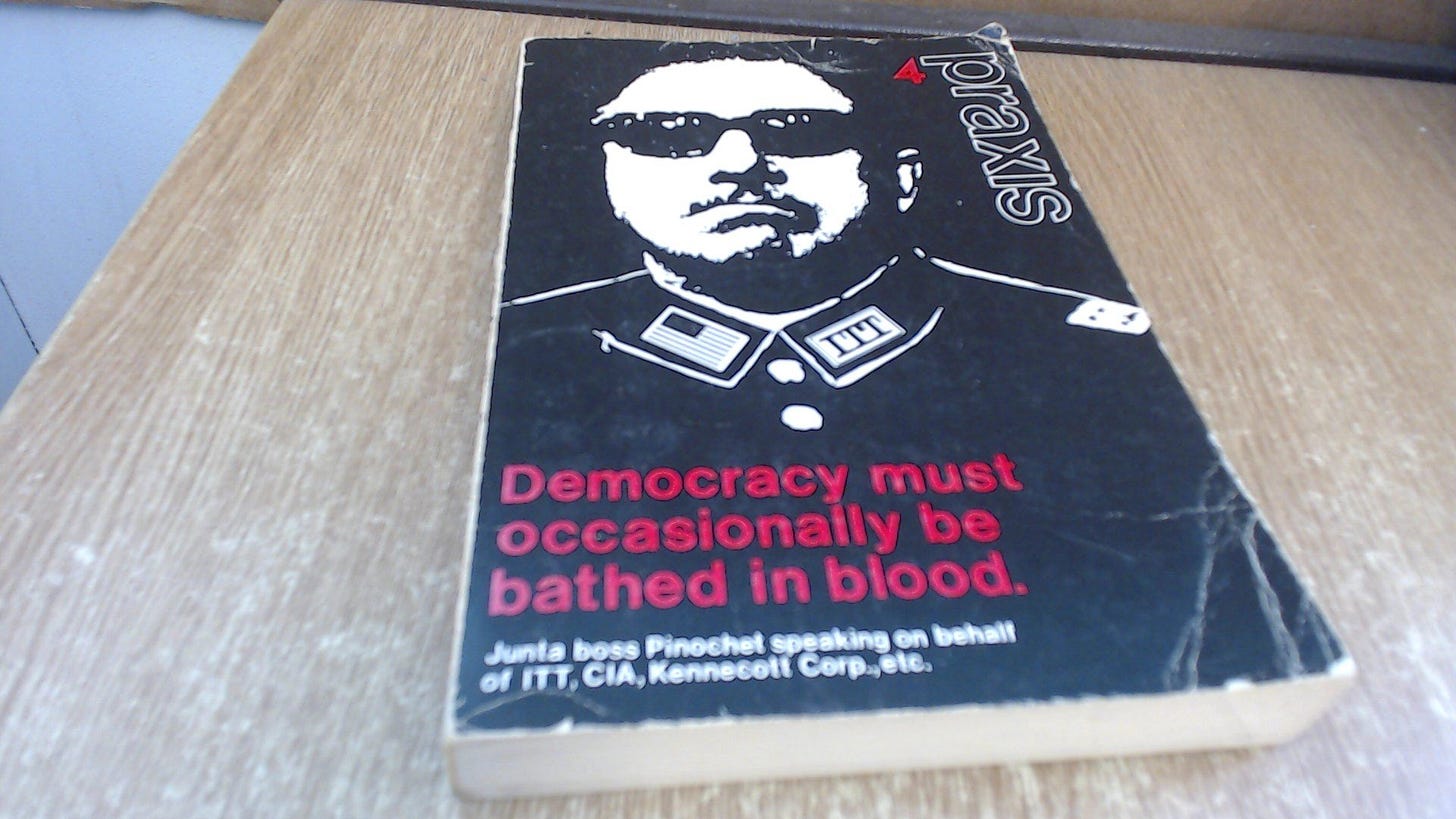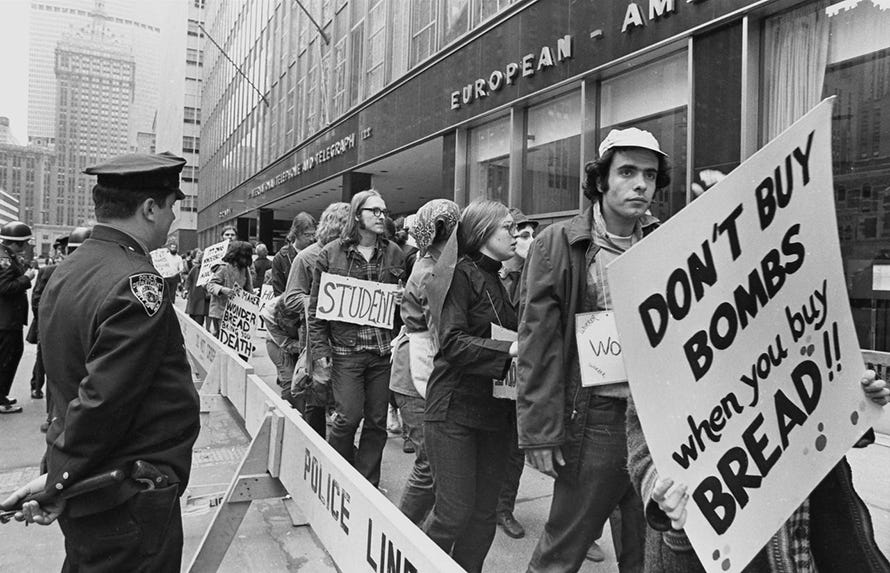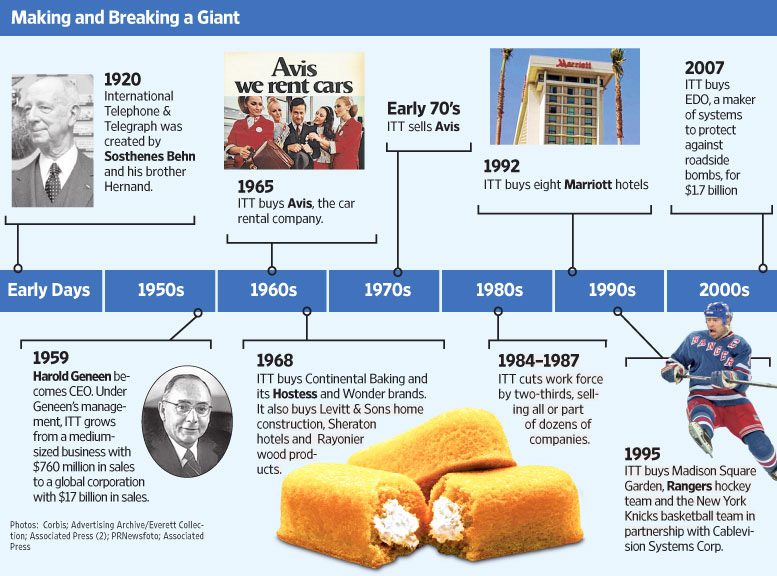Imperialism, Treason, and Terror
How ITT was Involved with the CIA, Acquired Wonder Bread, and the Occasional Democracy Bloodbath
My previous issue of the newsletter delved into Chile and the Cybersyn project, a venture that took place from 1971 to 1973, with the goal of constructing a distributed decision support system to aid in the management of the Chilean economy. I found the technological narrative of that era in Chile intriguing. This, along with the previous post, coincided with the 50th anniversary of the CIA-backed Pinochet coup, which overthrew the Allende government. An influential player in this coup was an American conglomerate known as The International Telephone and Telegraph Company (ITT), now rebranded as ITT Inc, with the new motto: “We convert unique ideas into engineering solutions that matter to our customers and help the world move forward.”

A lot has been written about ITT's role during the coup and its aftermath. Two prominent books, “The Sovereign State”(1973) and "Democracy Must Occasionally Be Bathed in Blood: Junta Boss Pinochet speaking on behalf of ITT, CIA, Kennecott Corp,” (1978) were published right after the coup. As of now, there are no recent books specifically focusing on ITT's involvement, although numerous books on Chile may mention ITT in passing. A 2023 publication entitled “Uncool and Incorrect" in Chile: The Nixon Administration and the Downfall of Salvador Allende looks interesting but I am guessing it primarily explores the post-Allende years. There is also writings on the Church Committee, a U.S. Senate committee investigating the CIA's activities, that detailed ITT's involvement in the Chilean coup. The report revealed that ITT had provided financial support to the coup plotters and had collaborated with the CIA to undermine the Chilean government. This report significantly damaged ITT's reputation and led to the company’s withdrawal from the Chilean market.
I was curious about recent developments: Are they still active in Chile? Are they attempting to influence or topple governments elsewhere? At least publicly, in the years since the Chilean coup, ITT has distanced itself from the CIA and taken steps to improve its corporate governance. The company has implemented policies to prevent future abuses. My research led me to Securities and Exchange Commission (SEC) filings, where the details lie. It appears that ITT is likely no longer working for the CIA and is more focused on converting “unique ideas into engineering solutions that matter to our customers and help the world move forward” and “pursuing transformative strategies to create value for shareholders”.
To provide some historical context, here's an excerpt from a 1973 article in The New York Times:
For a corporation conceived in deception and lawlessness — it tried to confuse itself in the 1920's with the more recognized name of A.T.&T. and entered into a cartel agreement with Ma Bell to divide up world telecommunications markets — ITT's 1972 activities reveal a half‐century of impressive consistency. But ITT did achieve something of a breakthrough last year. Now everybody knows its name.
Besides their involved with the CIA, ITT was known for their conglomeration and diversification strategy. From 1960 to 1973, their strategy was grounded in the belief that by acquiring a wide array of businesses, the company could mitigate its risks and enhance its financial performance. It's likely that they are not as diversified as they once were. Some of their acquisitions during this period included Sheraton Hotels, Avis Rent-a-Car, Hartford Insurance, and even the Continental Baking Company, the renowned maker of Wonder Bread. Indeed, Wonder Bread, a beloved brand, found itself associated with ITT, and the company became an early target of consumer activism. Anti-imperialist groups encouraged consumers to boycott bread products from ITT subsidiaries, with radical leftist publications running headlines such as “Buy Bread, Buy Bombs — ITT in Vietnam.” Some anti-war activists reinterpreted “ITT” as standing for “Imperialism, Treason, and Terror”
Moving beyond consumer goods and telecommunications, ITT gradually expanded into the defence and aerospace sectors. One such acquisition was Canteen Corporation, a food service company that catered to the military. Information about these mergers and acquisitions are scarce online. Here’s two from the NYT archives: “Vending Industry Is Widening Its Horizons” (1971) and another one about antitrust suit (1971) challenging the merger of the Canteen Corporation and ITT. Nevertheless, it's worth noting that ITT continues to secure defence contracts, as evidenced by this recent contract award.
ITT’s diversification strategy initially yielded success. By 1973, the company had over 350 subsidiaries, making it challenging for management to oversee them all. However, this very diversification also rendered ITT more susceptible to economic downturns. When the economy faltered in the early 1970s, ITT's profits suffered, and the company was compelled to divest several businesses and grapple with various legal challenges. As a diversified conglomerate acquiring numerous companies in the 1960s, ITT raised antitrust concerns due to its substantial size and market influence. The U.S. Department of Justice (DOJ) contended that ITT’s acquisitions had created monopolies in various sectors, including the hotel, car rental, and defence industry.
One avenue of my research led me to copper and mining.
Chile is the world’s leading copper producer, followed by Peru and China. It is worth noting that UK companies like BHP are the big corporate players, followed by Chilean corporations. Chile’s history of copper nationalisation dates back to the early 20th century when the government established the Chilean Copper Corporation (Codelco) in 1916. Codelco was initially state-owned but was privatised in the 1980s. This strategy also extended to ITT, which was affected due to the nationalisation of the telecommunication industry. This is linked to the Cybersyn project. Allende’s socialist agenda encompassed nationalising various industries, including banking and mining.
The nationalisation of the copper industry triggered opposition from foreign countries, especially the United States. The U.S. imposed economic sanctions on Chile, and the CIA played a role in orchestrating the 1973 coup that ousted Allende. Following the coup, the Pinochet regime reversed Allende’s nationalisation policies and privatised Codelco. However, the Chilean population remained supportive of copper nationalisation, leading to efforts to re-nationalise the industry in the early 2000s.
The significance of copper today lies in its crucial role in green technology and the shift away from fossil fuel-based energy sources. This is not only pertinent for supply chains but also for national control, not only in Chile but also in China. Policy advocates emphasise the need for transparency regarding control sources, increased recycling, avoidance of protectionist reactions, and the promotion of research and development in substitution technologies. The demand for copper is projected to surge by 350% by 2050 as the world moves toward clean energy but with significant environmental costs. This environmental concerns is not just for Chile. Also in the U.S.A. From a report in Truthdig (Aug 28, 2023):
An estimated 80% of lithium in North America sits within 35 miles of Native American reservations, according to Morgan Stanley Capital Investment, a financial research firm that advises the mining industry. So, too, is the case for other minerals pivotal to renewable energy development: 97% of nickel, 89% of copper, 68% of cobalt — all within 35 miles of reservations. Extractive development near Native American communities means jobs, yes, but historically it also has meant pollution, disruption of old lifeways, the killing out of wildlife, and social disorder and trauma. The rape, murder and disappearance of Indian women tends to skyrocket whenever mining, fracking, drilling and similar development occurs near their communities. It’s no surprise that tribes fear what’s coming with green-tech capitalism — because it’s a system wedded as always to corporate profits and economic growth.
During Allende’s era, ITT may not have been directly involved in mining, but companies like Anaconda Copper played a significant role. The Rockefeller and Guggenheim families were deeply entrenched in these mining operations, and Allende’s government posed challenges to them. The Guggenheim family transformed (from 1915-1923) Chuquicamata into the world’s largest copper mine, albeit with environmental and social costs.
ITT now again maintains subsidiaries in Chile, such as ITT Gould Pumps, which plays a big role in mining operations. ITT Gould Pumps operates a manufacturing facility in Quilicura, Chile, producing pumps for mining, oil and gas, and water industries. They also have a sales and service office in Santiago, Chile, supporting customers throughout South America.
Looking at SEC filings provides insights missing from corporate frontend. In February 2019, ITT Inc. disclosed a U.S. Securities and Exchange Commission (SEC) subpoena related to the Foreign Corrupt Practices Act (FCPA). The SEC's investigation is ongoing. In March 2019, ITT Inc. settled with the DOJ regarding sales practices in China, agreeing to pay a $10 million fine. In April 2019, they reached a similar settlement related to sales practices in the Middle East, resulting in a $5 million fine and compliance program implementation. Beyond these legal issues, ITT Inc. faces further compliance challenges, including DOJ investigations and class-action lawsuits alleging misleading investors about financial performance.
Here is an excerpt from 2019 SEC document regarding asbestos:
Subsidiaries of ITT, ITT LLC (f/k/a ITT Corporation) and Goulds Pumps LLC (f/k/a Goulds Pumps, Inc.), have been sued, along with many other companies, in numerous lawsuits in which the plaintiffs claim damages for personal injury arising from exposure to asbestos from component parts of certain products sold or distributed by various defendants, including certain ITT subsidiaries. We expect they will be sued in similar actions in the future. As such, we record an estimated liability related to pending claims and similar claims that we estimate will be filed over the next 10 years based on a number of key assumptions, including the likelihood of suits being filed, claim acceptance rates, disease type, settlement values and defense costs. These assumptions are derived from ITT’s recent experience and reflect our expectations about future claim activities. Although it is probable that the Company will incur additional costs for asbestos claims filed beyond the next 10 years, we do not believe that there is a reasonable basis for estimating those costs at this time.
In essence, while ITT may not be overtly involved in certain sectors, they continue to navigate legal and financial boundaries to optimise shareholder returns. As their historical ally Pinochet once stated, if some blood gets in the way, so be it.







Good stuff, Sharif! I'd never heard of ITT, but now I fully expect to fall down a rabbit hole.
Two things jump out at me.
First, in any conglomerate, complexity is key. The bigger the corporation, and the more distinct divisions and holding companies it creates, the easier it is hide stuff, launder money, backchannel with foreign governments, etc. My mind couldn't help but think of Amazon as the successor to ITT.
Second, every U.S. company or U.S. division violates the FCPA. Look at how pitiful the fines are. As an expense, and a cost of doing business, company management would be foolish not to pay a small bribe here, and a small fine later, while reaping a massive windfall in between.